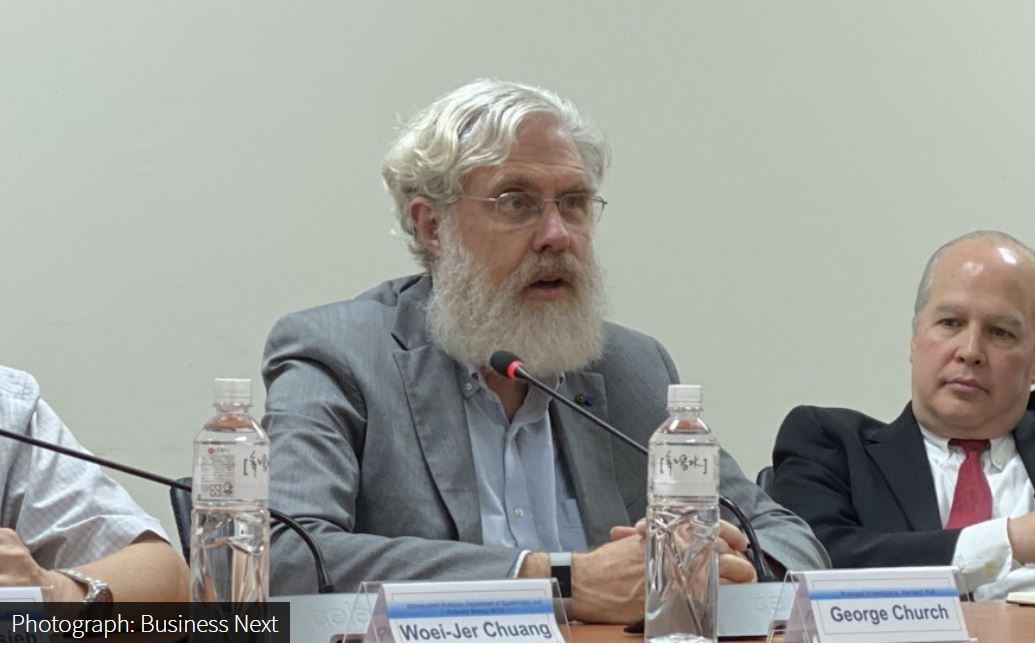Genomics pioneer George Church says Taiwan may be part of Personal Genome Project

Last week, genetic sequencing pioneer George Church visited Taipei at the invitation of the Ministry of Science and Technology (MOST) to evaluate whether the country might take part in the Personal Genome Project (PGP), noting that it’s a project that needs international collaboration to reach the ultimate goal of providing affordable, high-quality, and personalized medical care for the humankind.
Initiated in 2005 as a sequel to the Human Genome Project, the 13-year effort to determine the DNA sequence of human genome from beginning to end, PGP aims to collect genome, health, and trait data from 100 thousand participants across the globe to create an open database for scientists to unravel the relationship between human genetics and diseases.
With such database, they are able to come up with solutions to eliminate inherited diseases by sequencing genomes at an acceptably low cost, Mr. Church said. The cost has been plummeting over the past three decades, from some billion to a few hundred US dollars.
The global network of this project so far includes Canada, Austria, China, and the UK, each of which operates independently as a member in a loose confederation. “We want to have independent lines of language, customs, and laws to be country personalized,” Mr. Church said. “It’s crucial that every country be represented.”
He is therefore optimistic about Taiwan’s participation in the project, which shouldn’t be hampered by the size of the country. “It doesn’t require a lot of money and people but innovation and sharing of ideas,” he said. With its genetic and environmental diversity, Taiwan may add value to the network and make great contributions to the development of precision medicine.
Meanwhile, he referred to PGP as a “technology-sensitive project,” for which one might expect Taiwan, as one of the leading countries in the global ICT industry, can leverage its strength.
Academia Sinica, National Health Research Institutes (NHRI), and several top universities in Taiwan have been planning to form an alliance for a PGP-Taiwan initiative, Chuang Woei-jer, a medical science professor at National Cheng Kung University (NCKU) and a former director-general of the Department of Life Sciences at the MOST, according to Taipei Times.
Mr. Church has also promised to visit Taiwan again next year to sign an agreement with the alliance, he said.
From lab to world of business
In fact, Mr. Church isn’t only a scholar and professor of MIT and Harvard but also a profilic entrepreneur who has founded 20+ startups, including Nebula Genomics. His Boston lab, likewise, is more than a space for research but an incubator of startup ideas.
He told Business Next that it’s an environment where it’s okay to fail and be disorganized; “mediocrity is the enemy,” he said. In such lab culture, central to numerous sucesses he witnesses there, members regard experimentation as a part of their life and commit to thinking outside the box, he added.
Rather than following the sometimes overhyped technology trends created by investors, Mr. Church said he and his team monetize only the ideas and applications that are truly needed by the market.
New-born startups in the lab earn his two to three years of full attention — until the founders, also his students, are able to run the business independently and think he’s not necessary anymore, he laughed.
As many of them become a success, a positive feedback has been created: “all the previous students will come back and help their younger sibilings,” Mr. Church said. He described it as “a four-year-old [teaching] a two-year-old how to run,” but it’s an effective way for them to learn from each other. With this wonderful family, one can probably see one more startup success emerging from his lab sooner or later.
〔Original :Meet Startup @ TW〕
https://meet.bnext.com.tw/intl/articles/view/45634